(完整word版)外研版七年级下期末一般过去时复习
- 格式:doc
- 大小:52.01 KB
- 文档页数:8
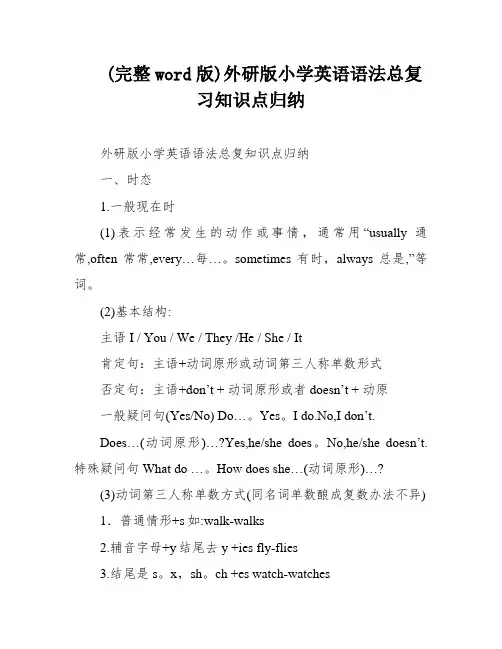
(完整word版)外研版小学英语语法总复习知识点归纳外研版小学英语语法总复知识点归纳一、时态1.一般现在时(1)表示经常发生的动作或事情,通常用“usually通常,often常常,every…每…。
sometimes有时,always总是,”等词。
(2)基本结构:主语I / You / We / They /He / She / It肯定句:主语+动词原形或动词第三人称单数形式否定句:主语+don’t + 动词原形或者doesn’t + 动原一般疑问句(Yes/No) Do…。
Yes。
I do.No,I don’t.Does…(动词原形)…?Yes,he/she does。
No,he/she doesn’t.特殊疑问句What do …。
How does she…(动词原形)…?(3)动词第三人称单数方式(同名词单数酿成复数办法不异)1.普通情形+s如:walk-walks2.辅音字母+y结尾去y +ies fly-flies3.结尾是s。
x,sh。
ch +es watch-watches4.结尾是0 +es do-does。
go-goes5.特殊have-has2.现在进行时(1)表示正在发生的动作,通常用“now现在。
look看,XXX听”.(2)根本方式: be +动词-ingeg: I am(not) XXX.You/We/They are(not) reading。
He/She/It is(not) eating.What are you doing。
Is he reading?(3)动词的目前分词方式(动词+ing)普通情形+ing walk—walking末端是不发音的e-e+ingcome—coming重读闭音节双写末了一个字母+ingswim-swimming。
run-running3.一般过去时(1)表示过去已经发生的事情,通常用“last …上一个…。
just now刚才,many years ago许多年前,XXX昨天”等词。
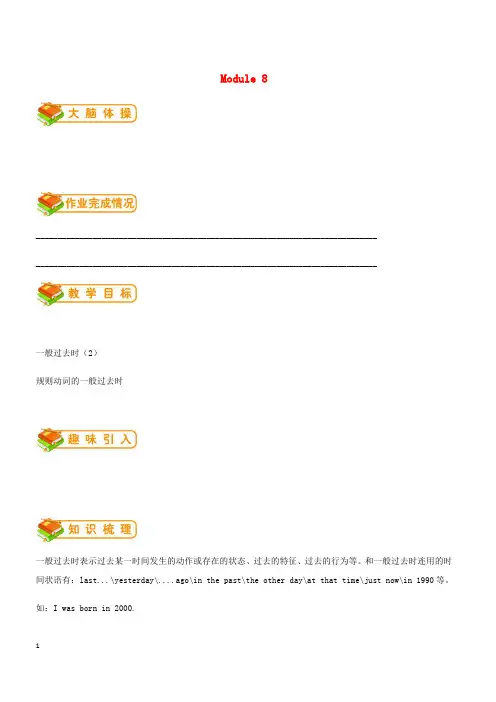
Module8____________________________________________________________________________________________________________________________________________________________一般过去时(2)规则动词的一般过去时一般过去时表示过去某一时间发生的动作或存在的状态、过去的特征、过去的行为等。
和一般过去时连用的时间状语有:last...\yesterday\....ago\in the past\the other day\at that time\just now\in1990等。
如:I was born in2000.He went to the museum yesterday.We climbed the mountain last week.规则动词过去式的变化规则变化规则原形过去式一般动词词尾加-ed walk look walked looked以“元音字母+一个辅音字母结尾”的重读闭音节动词,双写辅音字母再加-edstop step stopped stepped以“辅音字母+y结尾”的动词,y变为i,再加-edhurry marry hurried married一般过去时的肯定、否定、疑问和回答方式的变化如下:肯定否定一般疑问句回答I started school at five.I didn’t(didn’t)startschool at five.Did I start school atfive?Yes,I did.No,I didn’t.You took a walk this morning.You didn’t(didn’t)take awalk this morning.Did you take a walkthis morning?Yes,you did.No,you didn’t.He\She moved to London.He\She didn’t(didn’t)move to London.Did he\she move toLondon?Yes,he\she did.No,he\shedidn’t.It rained heavily.It didn’t (didn’t)rain heavily.Did it rain heavily?Yes,it did.No,it didn’t.We played football yesterday.We didn’t (didn’t)play football yesterday.Did we play football yesterday?Yes,we did .No,we didn’t.They played basketball lastweek.They didn’t (didn’t)play basketball last week.Did they play basketball last week?Yes,they did.No,they didn’t.单项选择1.I __________tennis yesterday.A.play B.will playC.playedD.are playing答案:C解析:考查一般过去时,根据yesterday 可知答案是C。
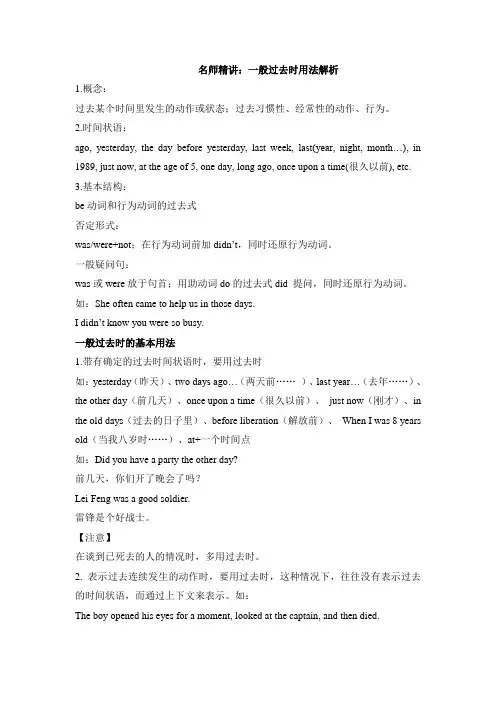
名师精讲:一般过去时用法解析1.概念:过去某个时间里发生的动作或状态;过去习惯性、经常性的动作、行为。
2.时间状语:ago, yesterday, the day before yesterday, last week, last(year, night, month…), in 1989, just now, at the age of 5, one day, long ago, once upon a time(很久以前), etc. 3.基本结构:be动词和行为动词的过去式否定形式:was/were+not;在行为动词前加didn’t,同时还原行为动词。
一般疑问句:was或were放于句首;用助动词do的过去式did 提问,同时还原行为动词。
如:She often came to help us in those days.I didn’t know you were so busy.一般过去时的基本用法1.带有确定的过去时间状语时,要用过去时如:yesterday(昨天)、two days ago…(两天前……)、last year…(去年……)、the other day(前几天)、once upon a time(很久以前)、just now(刚才)、in the old days(过去的日子里)、before liberation(解放前)、When I was 8 years old(当我八岁时……)、at+一个时间点如:Did you have a party the other day?前几天,你们开了晚会了吗?Lei Feng was a good soldier.雷锋是个好战士。
【注意】在谈到已死去的人的情况时,多用过去时。
2. 表示过去连续发生的动作时,要用过去时,这种情况下,往往没有表示过去的时间状语,而通过上下文来表示。
如:The boy opened his eyes for a moment, looked at the captain, and then died.那男孩把眼睛张开了一会儿,看看船长,然后就去世了。
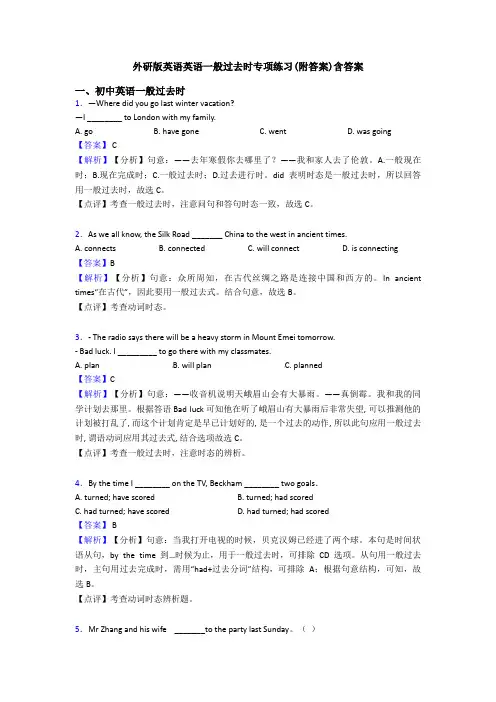
外研版英语英语一般过去时专项练习(附答案)含答案一、初中英语一般过去时1.—Where did you go last winter vacation?—I ________ to London with my family.A. goB. have goneC. wentD. was going【答案】 C【解析】【分析】句意:——去年寒假你去哪里了?——我和家人去了伦敦。
A.一般现在时;B.现在完成时;C.一般过去时;D.过去进行时。
did表明时态是一般过去时,所以回答用一般过去时,故选C。
【点评】考查一般过去时,注意问句和答句时态一致,故选C。
2.As we all know, the Silk Road _______ China to the west in ancient times.A. connectsB. connectedC. will connectD. is connecting【答案】B【解析】【分析】句意:众所周知,在古代丝绸之路是连接中国和西方的。
In ancient times“在古代”,因此要用一般过去式。
结合句意,故选B。
【点评】考查动词时态。
3.- The radio says there will be a heavy storm in Mount Emei tomorrow.- Bad luck. I _________ to go there with my classmates.A. planB. will planC. planned【答案】C【解析】【分析】句意:——收音机说明天峨眉山会有大暴雨。
——真倒霉。
我和我的同学计划去那里。
根据答语Bad luck可知他在听了峨眉山有大暴雨后非常失望, 可以推测他的计划被打乱了, 而这个计划肯定是早已计划好的, 是一个过去的动作, 所以此句应用一般过去时, 谓语动词应用其过去式, 结合选项故选C。
【点评】考查一般过去时,注意时态的辨析。
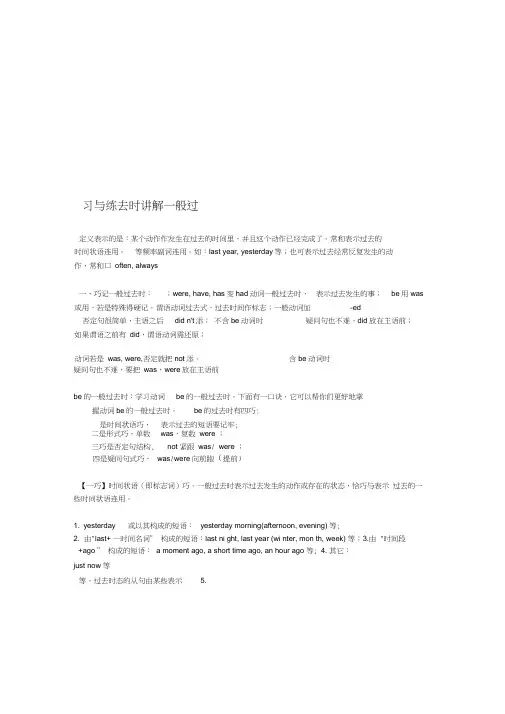
习与练去时讲解一般过定义表示的是:某个动作作发生在过去的时间里,并且这个动作已经完成了。
常和表示过去的时间状语连用。
等频率副词连用。
如:last year, yesterday等;也可表示过去经常反复发生的动作,常和口often, always一、巧记一般过去时:;were, have, has变had动词一般过去时,表示过去发生的事;be用was 或用,若是特殊得硬记。
谓语动词过去式,过去时间作标志;一般动词加-ed 否定句很简单,主语之后did n't添;不含be动词时疑问句也不难,did放在主语前;如果谓语之前有did,谓语动词需还原;动词若是was, were,否定就把not添。
含be动词时疑问句也不难,要把was,were放在主语前be的一般过去时:学习动词be的一般过去时,下面有一口诀,它可以帮你们更好地掌握动词be的一般过去时。
be的过去时有四巧:是时间状语巧,表示过去的短语要记牢;二是形式巧,单数was,复数were ;三巧是否定句结构, not 紧跟was/ were ;四是疑问句式巧,was/were向前跑(提前)【一巧】时间状语(即标志词)巧。
一般过去时表示过去发生的动作或存在的状态,恰巧与表示过去的一些时间状语连用。
1. yesterday 或以其构成的短语:yesterday morning(afternoon, evening) 等;2. 由"last+ —时间名词” 构成的短语:last ni ght, last year (wi nter, mon th, week) 等;3.由 "时间段+ago ” 构成的短语:a moment ago, a short time ago, an hour ago 等; 4. 其它:just now 等等。
过去时态的从句由某些表示 5.【二巧】形式巧。
它与一般现在时一样,形式多样:当主语是第一人称单数或第三人称单数时, 谓语。
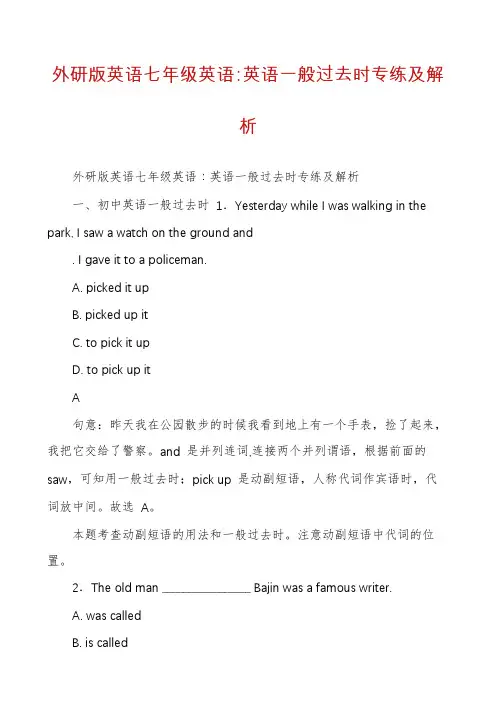
外研版英语七年级英语∶英语一般过去时专练及解析外研版英语七年级英语∶英语一般过去时专练及解析一、初中英语一般过去时1.Yesterday while I was walking in the park, I saw a watch on the ground and. I gave it to a policeman.A. picked it upB. picked up itC. to pick it upD. to pick up itA句意:昨天我在公园散步的时候我看到地上有一个手表,捡了起来,我把它交给了警察。
and 是并列连词,连接两个并列谓语,根据前面的saw,可知用一般过去时;pick up 是动副短语,人称代词作宾语时,代词放中间。
故选A。
本题考查动副短语的用法和一般过去时。
注意动副短语中代词的位置。
2.The old man _________________ Bajin was a famous writer.A. was calledB. is calledC. calledD. callsC句意:老人巴金是一位著名的作家。
谓语动词是was,故此处缺少非谓语动词,call 与man 是被动关系,故是过去分词用后置定语,故选C。
考查非谓语动词,注意过去分词的用法。
3.After Steven sent some e-mails ,he______ surfing the Internet.A. startsB. has startedC. will startD.startedD句意:Steven 发了一些电子邮件之后,他就开始上网冲浪。
start 开始,是一个动词。
根据句意和上句话中Steven sent some e-mails 可知,这里应该用一般过去时。
故选D。
A 是一般现在时;B 是现在完成时;C 是一般将来时。
考查动词时态。
4.Heto play sports, but now he is interested in soccer and volleyball.A. doesn“t useB. wasn"t usedC. didn"t useD. didn"t usedC句意:他______做运动,但是现在他对足球和排球很感兴趣。
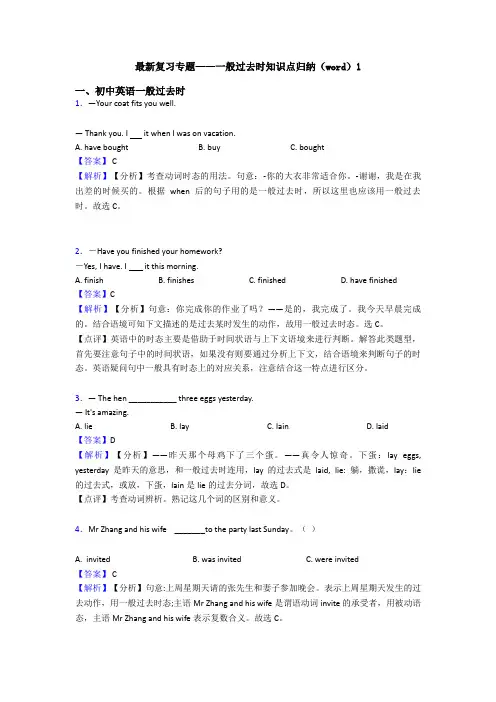
最新复习专题——一般过去时知识点归纳(word)1一、初中英语一般过去时1.—Your coat fits you well.— Thank you. I it when I was on vacation.A. have boughtB. buyC. bought【答案】 C【解析】【分析】考查动词时态的用法。
句意:-你的大衣非常适合你。
-谢谢,我是在我出差的时候买的。
根据when后的句子用的是一般过去时,所以这里也应该用一般过去时。
故选C。
2.-Have you finished your homework?-Yes, I have. I it this morning.A. finishB. finishesC. finishedD. have finished【答案】C【解析】【分析】句意:你完成你的作业了吗?——是的,我完成了。
我今天早晨完成的。
结合语境可知下文描述的是过去某时发生的动作,故用一般过去时态。
选C。
【点评】英语中的时态主要是借助于时间状语与上下文语境来进行判断。
解答此类题型,首先要注意句子中的时间状语,如果没有则要通过分析上下文,结合语境来判断句子的时态。
英语疑问句中一般具有时态上的对应关系,注意结合这一特点进行区分。
3.— The hen ___________ three eggs yesterday.— It's amazing.A. lieB. layC. lainD. laid【答案】D【解析】【分析】——昨天那个母鸡下了三个蛋。
——真令人惊奇。
下蛋:lay eggs, yesterday是昨天的意思,和一般过去时连用,lay的过去式是laid, lie: 躺,撒谎,lay:lie 的过去式,或放,下蛋,lain是lie的过去分词,故选D。
【点评】考查动词辨析。
熟记这几个词的区别和意义。
4.Mr Zhang and his wife _______to the party last Sunday。
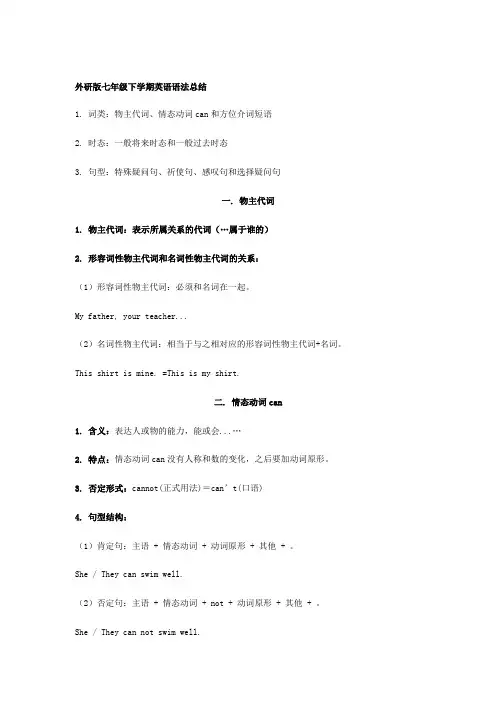
外研版七年级下学期英语语法总结1. 词类:物主代词、情态动词can和方位介词短语2. 时态:一般将来时态和一般过去时态3. 句型:特殊疑问句、祈使句、感叹句和选择疑问句一. 物主代词1. 物主代词:表示所属关系的代词(…属于谁的)2. 形容词性物主代词和名词性物主代词的关系:(1)形容词性物主代词:必须和名词在一起。
My father, your teacher...(2)名词性物主代词:相当于与之相对应的形容词性物主代词+名词。
This shirt is mine. =This is my shirt.二. 情态动词can1. 含义:表达人或物的能力,能或会...…2. 特点:情态动词can没有人称和数的变化,之后要加动词原形。
3. 否定形式:cannot(正式用法)=can’t(口语)4. 句型结构:(1)肯定句:主语 + 情态动词 + 动词原形 + 其他 + 。
She / They can swim well.(2)否定句:主语 + 情态动词 + not + 动词原形 + 其他 + 。
She / They can not swim well.(3)一般疑问句:情态动词 + 主语 + 动词原形 + 其他 + ?Can she / they swim well?Yes, she / they can. / No, she / they can’t.(4)特殊疑问句:特殊疑问词 + 情态动词 + 主语 + 动词原形 + 其他 + ?Why can she / they swim well?Who can swim well?三. 介词between...and... 在两者之间Lingling sits between Tony and Daming. 玲玲坐在托尼和大明之间。
among 在三者或三者以上之间Miss Li is among lots of students. 李老师在许多同学之间。
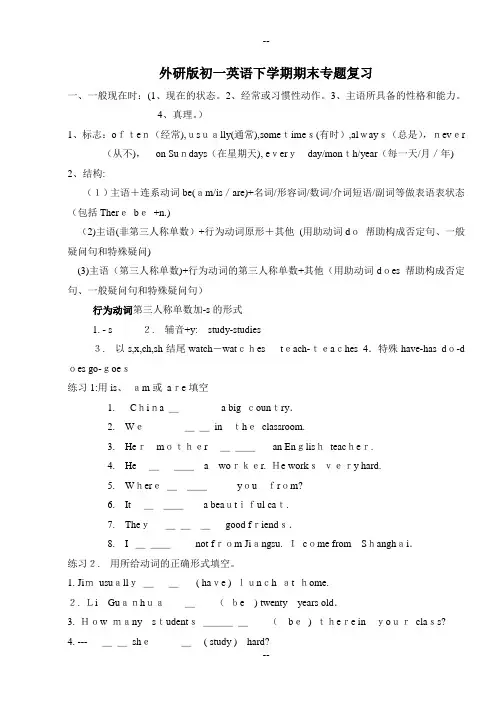
外研版初一英语下学期期末专题复习一、一般现在时:(1、现在的状态。
2、经常或习惯性动作。
3、主语所具备的性格和能力。
4、真理。
)1、标志:often(经常),usually(通常),sometimes(有时),always(总是),never(从不),on Sundays(在星期天), everyday/month/year(每一天/月/年) 2、结构:(1)主语+连系动词be(am/is/are)+名词/形容词/数词/介词短语/副词等做表语表状态(包括Therebe+n.)(2)主语(非第三人称单数)+行为动词原形+其他(用助动词do帮助构成否定句、一般疑问句和特殊疑问)(3)主语(第三人称单数)+行为动词的第三人称单数+其他(用助动词does 帮助构成否定句、一般疑问句和特殊疑问句)行为动词第三人称单数加-s的形式1. - s 2.辅音+y:study-studies3.以s,x,ch,sh结尾watch-watches teach-teaches 4.特殊have-has do-d oes go-goes练习1:用is、am或are填空1.China _________ a big country.2.We__________intheclassroom.3.Hermother _________ an Englishteacher.4.He ________a worker. He worksvery hard.5.Where_________youfrom?6.It _________ a beautiful cat.7.They_________good friends.8.I ________not from Jiangsu. Icome from Shanghai.练习2.用所给动词的正确形式填空。
1. Jimusually________ ( have ) lunch at home.2. Li Guanhua_______ (be) twenty years old.3. How many students________ (be) there inyourclass?4. ---______she_______ ( study )hard?---Yes, she _________.5.Lucy and lily_____________( not speak)Chinese.6.Myfather______________ ( not do)morning exercises every day. 7.Shealways___________(wash)her clothes on Sundays.8. ______ your brother________ ( like ) playing football? No, he____________.二.现在进行时:表示说话瞬间或现阶段正在进行的动作。
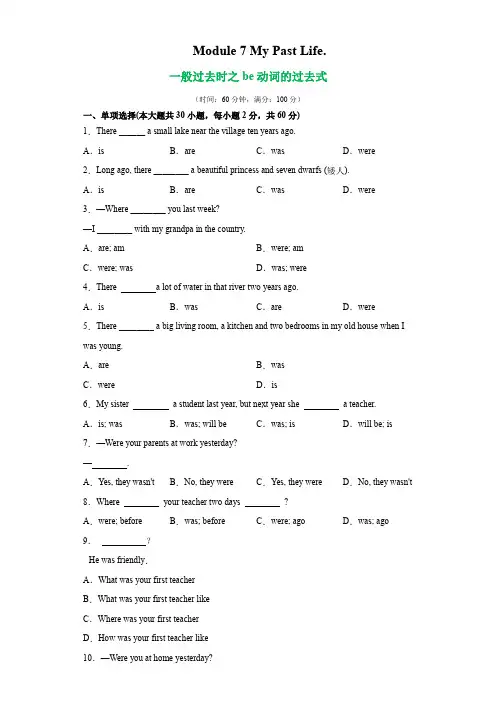
Module 7 My Past Life.一般过去时之be动词的过去式(时间:60分钟,满分:100分)一、单项选择(本大题共30小题,每小题2分,共60分)1.There ______ a small lake near the village ten years ago.A.is B.are C.was D.were 2.Long ago, there ________ a beautiful princess and seven dwarfs (矮人).A.is B.are C.was D.were 3.—Where ________ you last week?—I ________ with my grandpa in the country.A.are; am B.were; amC.were; was D.was; were4.There a lot of water in that river two years ago.A.is B.was C.are D.were 5.There ________ a big living room, a kitchen and two bedrooms in my old house when I was young.A.are B.wasC.were D.is6.My sister a student last year, but next year she a teacher.A.is; was B.was; will be C.was; is D.will be; is 7.—Were your parents at work yesterday?—.A.Yes, they wasn't B.No, they were C.Yes, they were D.No, they wasn't 8.Where your teacher two days ?A.were; before B.was; before C.were; ago D.was; ago 9.--?--He was friendly.A.What was your first teacherB.What was your first teacher likeC.Where was your first teacherD.How was your first teacher like10.—Were you at home yesterday?—. I was in the school.A.Yes, I am B.No, I'm not C.Yes, I was D.No, I wasn't 11.There a big living room and two bedrooms in our new house.A.was B.were C.be D.are12.— you away home yesterday morning?— No, I .A.Are; ’ m not B.Were; were C.Were; weren’ t D.Were; wasn’ t 13.— When and where ____ you born ? —I ____ born in Shanghai ____ September 1, 1990. A.was, were, at B.were, was, on C.was, was, on D.were, was, in 14.(2017辽宁丹东)Look! There a pair of glasses and two boxes on the table.A.is B.areC.was D.were15.The doctor in a small town.A.is born B.are born C.was born D.were born 16.— When and where ____ you born ?—I ____ born in Shanghai ___ September 1, 1990.A.was, were, at B.were, was, in C.was, was, on D.were, was, on 17.My classmates at home. They were on a school trip.A.was B.were C.was not D.were not 18.There________ a lot of water in this river ten years ago.A.have B.is C.were D.was 19.There some meat in the fridge yesterday.A.is B.was C.are D.were20.Mr Black born a big city in America.A.were; of B.was; in C.was; at D.were; of 21.When he young, there not so much food for him.A.is; is B.was; was C.is; was D.was; is 22.—What were they like?—________.A.They have long hair B.They were born in a cityC.They were three years old D.They were friendly23.What the name of your primary school?A.was B.were C.does D.has24.He was born ________ 18th July, 1938 ________ a small village.A.on, on B.on, in C.in, in D.in, on 25.No one ________ in the room yesterday.A.are B.were C.is D.was 26.lots of children?A.There were B.They were C.Were there D.Were they 27.—Were your parents at work yesterday?—________.A.Yes, they wasn't B.No, they wereC.Yes, they were D.No, they wasn't28.Those boys difficult at school in the past, but now they good. A.are; were B.were; are C.was; is D.are; is 29.There ________ lots of homework ________ the day before yesterday.A.were, to do B.was, to do C.were, doing D.was, doing 30.There one apple and two bananas in the basket.A.is B.are C.were D.be二、用所给单词的正确形式填空(本大题共10小题,每小题1分,共10分)用be动词的适当形式填空31.There___________ a telephone call for you just now.32.There____________not enough people to pick apples on the farm that day. 33.—Where____________you born?—I____________born in Dalian.34.—__________ they your good friends?—Yes, they were.35.___________it cold in your city yesterday?36.Hou Li ________ in Dali last week.37.There ________a car and two bikes in front of the house yesterday.38.—Was Mr Li your teacher?—No, he________ (not be).39.There________some people in the park now, but there ________ (not be) any yesterday.40.I ________ in the movie theatre yesterday, but they ________ in the school.三、句型转换(本大题共15小题,每小题2分,共30分)41.We were at school yesterday.(改为否定句)We_______ ________at school yesterday.42.What’s the weather like today?(用last Sunday改写句子)________ _________the weather like last Sunday?43.Miss Smith was nice and friendly.(对画线部分提问)_______was Miss Smith________?44.Mrs Gao was my first English teacher.(对画线部分提问)________ ________your first English teacher?45.--Was your grandfather a teacher?(作否定回答)--No,________ _________.46.I am a teacher at No.7 Middle School.(改为一般过去时)I________a teacher at No.7 Middle School.47.Tom was very friendly.(改为一般疑问句并作肯定回答)--________Tony very friendly?--Yes,__________ _________.48.John was nice at school.(对画线部分提问)________ ________John________at school?49.I was in Beijing two weeks ago.(改为否定句)I_____ _____ in Beijing two weeks ago.50.My first English teacher was Miss Wang.(对画线部分提问) __________was your first English teacher?51.Many people were in the park last Sunday.(改为同义句)________________ many people in the park last Sunday.52.There were some people in the park.(改为否定句)There ________ ________ people in the park.53.I was born in the countryside in1990.(对画线部分提问)________ ________ ________ ________ you ________54.Lily and Tom were Daming’ s first friends.(改为一般疑问句并作否定回答)— ________ Lily and Tom Daming’ s first friends— No, ________ ________ .55.There were 3 rooms in the old house.(对画线部分提问)________ ________ ________ ________ there in the old house?参考答案:1.C【解析】句意:十年前,村子附近有一个小湖。
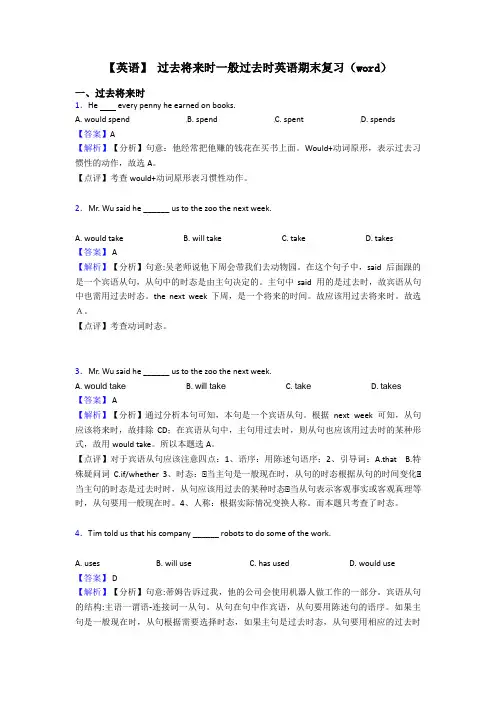
【英语】过去将来时一般过去时英语期末复习(word)一、过去将来时1.He every penny he earned on books.A. would spendB. spendC. spentD. spends【答案】A【解析】【分析】句意:他经常把他赚的钱花在买书上面。
Would+动词原形,表示过去习惯性的动作,故选A。
【点评】考查would+动词原形表习惯性动作。
2.Mr. Wu said he ______ us to the zoo the next week.A. would takeB. will takeC. takeD. takes【答案】 A【解析】【分析】句意:吴老师说他下周会带我们去动物园。
在这个句子中,said 后面跟的是一个宾语从句,从句中的时态是由主句决定的。
主句中said 用的是过去时,故宾语从句中也需用过去时态。
the next week 下周,是一个将来的时间。
故应该用过去将来时。
故选A。
【点评】考查动词时态。
3.Mr. Wu said he ______ us to the zoo the next week.A. would takeB. will takeC. takeD. takes【答案】 A【解析】【分析】通过分析本句可知,本句是一个宾语从句。
根据next week可知,从句应该将来时,故排除CD;在宾语从句中,主句用过去时,则从句也应该用过去时的某种形式,故用would take。
所以本题选A。
【点评】对于宾语从句应该注意四点:1、语序:用陈述句语序;2、引导词:A.that B.特殊疑问词C.if/whether 3、时态:•当主句是一般现在时,从句的时态根据从句的时间变化‚当主句的时态是过去时时,从句应该用过去的某种时态ƒ当从句表示客观事实或客观真理等时,从句要用一般现在时。
4、人称:根据实际情况变换人称。
而本题只考查了时态。
4.Tim told us that his company ______ robots to do some of the work.A. usesB. will useC. has usedD. would use【答案】 D【解析】【分析】句意:蒂姆告诉过我,他的公司会使用机器人做工作的一部分。
教学内容四大时态综合复习教学各种时态的用法及动词对应的形式重、难点Part 1 检查并评讲作业Part 2 语法点【一般现在时的用法】一、概述一般现在时表示习惯性、经常性、反复性的动作或存在的状态。
“习惯性、经常性、反复性”是一般现在时的三大特性,它不表示特定时间内发生的事。
二、一般现在时的结构1. 句中有be动词时,用is,am,are2. 句中无be动词时,用动词原形。
若主语为第三人称单数,动词变成单三。
三、动词第三人称单数变化规则1. 一般在词尾加-s。
2. 以-o, -s, -x, -sh, -ch结尾的加-es3. 以辅音字母加y结尾的,变y为i,再加-es。
四、标志词频度副词(always, usually, often, ...),every day, every week, every year…【目标一例题】一、写出下列动词的三单形式。
go__________ catch_________ brush(刷)_____ wash___________do________ like________ have___________ watch________drink ___________ fly___________ say_______ learn ___________eat___________ read___________ sing___________ buy__________study_________ stay __________ make __________ look ________plant ______ pass__________ carry __________ come__________ teach_______二、用括号内动词的适当形式填空。
1. We often___________(play) in the playground.比比谁心细~2. He _________(get) up at six o’clock.3.__________you_________(brush) your teeth every morning.4. What________ (do) he usually______ (do) after school?5.Danny_______(study)English, Chinese, Maths, Science and Art at school.6. Mike sometimes __________(go) to the park with his sister.7. At eight at night, she often__________(watch) TV with his parents.8. ________ Mike________(read) English every day?9.How many lessons_________your classmate________(have) on Monday?10. What time_________his mother_________(do) the housework?三、选择题。
(关键词:always, often, sometimes, usually, every…, twice a week, …never‘从不’…)一、单项选择:1、Tom is a worker. He ______ in a factory. His sisters_______ in a hospital.A:work, work B:works, work C:work, works2、Mrs. Read ______ the window once a week.A:is cleaning B:clean C:cleans3、The twins usually ______ milk and bread for breakfast, but Jim only______ some soup for it.A:have, have B:have, has C:has, have4、We ______ music and often ______ to it.A:like, listen B:likes, listens C:like, are listening5、The twins ______ milk and bread for breakfast every morning.A:have B:has C:had二、用括号内动词的适当形式填空。
(关键词?)1. We_____(be) students. We often____(play) in the playground.2. He _____(be) a boss. He always_____(get) up at 10:30.3. She______(brush) her teeth every morning.4. They sometimes______(stop) to have a rest.They usually_______(do) the work after school.5. Danny______(study) English, Chinese ,Maths and Art an school.6. Mike sometimes______(go) to the park with his sister.7. She usually______(watch) TV with his parents on Sundays.8. Mike and Jerry______(read) English every morning.They______(be) good friends.9. My classmate______(have) English lessons on Mondays.10. His mother______(do)the housework every morning.三、把下面的句子变为其否定式,然后变成疑问句。
外研版七年级下册全部语法内容大汇总一. 情态动词can的用法can+动词原形,它不随主语的人称和数而变化。
1. 含有can的肯定句:主语+can+谓语动词的原形+其他。
2. 含有can的否定句:主语+can't+动词的原形+其他。
3. 变一般疑问句时,把can提前:Can+主语+动词原形+其他?肯定回答:Yes,主语+can。
否定回答:No,主语+can't.4. 含有can的特殊疑问句:特殊疑问词+can+主语+动词原形+其他?I can speak English.→I can't speak English.→Can you speak English? →What can you speak?二. what time和when引导的特殊疑问句1. 询问钟点时用what time,询问日期、月份、年份时用when。
2. What's the time?=What time is it?现在几点了?3. 时刻表达法:顺读法和逆读法。
顺读法:“钟点+分钟”直接读数字。
如:7: 05 seven five;8:16 eight sixteen逆读法:借助介词past或to表示,要先说分再说钟点。
a. 当分钟不超过30分钟时(包括30分钟),即<或=30,用past表示。
其结构为:“分钟+past+整点”意为“几点过几分”。
如:1:25 twenty-five past oneb. 当超过30分钟时,即>30,用to表示。
其结构为:“所差分钟(即60—所过分钟数)+to+下一个整点”,to译成“差”,差几分钟到几点。
如:4:38 twenty-two to fivec. 当分钟为30分钟用half表示,当分钟为15分钟用a quarter。
三. how引导的特殊疑问句1. how 引导的特殊疑问句提问交通方式,其答语分三种情况:a. take a/an/the+交通工具(单数)b. by+交通工具(单数)c. on/in+限定词+交通工具---How do you go to school every day?---I take a bus to go to school every day./I go to school by bus every day./I go to school on t he bus every day.2. how far 用来提问距离,多远,其答语分为两种:(1)用长度单位表示:It is five kilometers.(2)用时间表示:It’s twenty minutes’walk.3. how long 用来提问时间,意为多久回答常用“for+段时”。
英语一般过去时专项练习1、含义:一般过去时表示过去某个时间发生的动作或存在的状态,常和表示过去的时间状语连用。
一般过去时也表示过去经常或反复发生的动作感谢。
2、Be动词在一般过去时中的变化:⑴am 和is在一般过去时中变为was。
(was not=wasn’t)⑵are在一般过去时中变为were。
(were not=weren’t)⑶带有was或were的句子,其否定、疑问的变化和is, am, are一样,即否定句在was或were后加not,一般疑问句把was或were调到句首。
3、句中没有be动词的一般过去时的句子否定句:didn’t +动词原形,如:Jim didn’t go home yesterday.一般疑问句:在句首加did,句子中的动词过去式变回原形。
如:Did Jim go home yesterday?4.代表词:yesterday, yesterday morning/afternoon/evening, last week/month/year, last summer, last Sunday,…ago, in+过去的时间等的过去时间状语。
特殊疑问句:⑴疑问词+did+主语+动词原形?如:What did Jim do yesterday?⑵疑问词当主语时:疑问词+动词过去式?如:Who went to home yesterday?动词过去式变化规则:1.一般在动词末尾加-ed,如:pull-pulled, cook-cooked2.结尾是e加d,如:taste-tasted3.末尾只有一个元音字母和一个辅音字母的重读闭音节,应双写末尾的辅音字母,再加-ed,如:stop-stopped4.以“辅音字母+y”结尾的,变y为i,再加-ed,如:study-studied5.不规则动词过去式:am,is-was are-were, do-did, see-saw, say-said give-gave, get-got, go-went come-came, have/has-had, eat-ate, take-took, run-ran, sing-sang, put-put,make-made, read-read, write-wrote, draw-drew, drink-drank,fly-flew, ride-rode, speak-spoke, sweep-swept, buy-bought find-foundthink-thought tell-told read-read swim-swam, sit-sat bring--brought can-could cut-cut become-became begin-began draw-drew feel-felt forget-forgot hear-heard keep-kept know-knew write-wrote learn-learnt(learned) leave-left let-letteach-taught lose-lost meet-met sleep-slept speak-spoke take-took一、过去时练习:写出下列动词的过去式is\am_________ fly_______ study________ are ________ drink_________play_______ go________ make ________ does_________ dance________worry________ ask _____ taste_________ eat__________ draw________put ______ have________ stop_________ read_______ do ________二、句型转换。
一般过去时复习He was at home yesterday.I got up at six thirty yesterday morning.I visited my aunt last weekend.2、表示过去经常或反复发生的动作。
My father often went to work by bus last year.When I was a child, I often listened to music.常与一般过去时态连用的时间有:yesterday, the other day, just now ,last night (week, month, year…) two days ago, a week ago, three years ago…(如:in 1990),from 1970 to 1980动词的过去时:+ be动词的过去式(was, were)+其他.否定句:主语+ be动词的过去式(was, were)+ not +其他.疑问句:Be 动词的过去式(was, were)+主语+其他?肯定回答:主语+ was/were . 否定:主语+wasn't/weren't.例如:He was busy yesterday.否定句:疑问句:肯定回答:. 否定:.练习:用be动词的适当形式填空1.I ______ at school just now.2.He ______ at home last week.3.We _________ students two years ago.4.There ______ an apple tree in front of my house before .行为动词的过去时:+ 行为动词的过去式+其他.否定句:主语+didn’t + V原型+其他.疑问句:Did +主语+V原型+其他?肯定回答:主语+did 否定:主语+didn’t例如:He walked to school yesterday.否定句:疑问句:. 否定:.动词过去式的小结(规则变化)edwalk—listen —look—2.以不发音字母“e”为结尾的动词后加- d live—notice—decide —3.以辅音字母加-y结尾的动词,变y为i,再加-ed. hurry—carry—cry—try—4.以重读闭音节结尾的动词,先双写后面辅音字母,再加-ed.step—动词过去式中ed 发音:组成英文的多样化。
辅音包括清辅音和浊辅音两大类。
发音时声带不震动、送气的叫清辅音;发音时声带震动、不送气的叫浊辅音。
清辅音:送气强,声带不振动。
浊辅音:几乎不送气,声带振动。
清音/p/ /t/ /k/ /f/ /s/ /tr/ /ts/ /h/浊音/b/ /d/ /g/ /v/ /z/ /3/ /d3/ /dr/ /dz/ /r/ /m/ /n/ /l/ /w/ /j/)1.以清辅音结尾的动词加-ed 后,ed读作/ t /knock knocked pick picked like liked push pushed stop stopped 2.以浊辅音和元音结尾的动词加-ed后,ed读作/ d /answer answered enter entered hurry hurried live lived3.以字母t, d结尾的动词加-ed后,ed读作/ id /count counted decide decided写出下列动词的过去式getislivesenddriverunaskpushsayhurrytryuseworkstopjumpmeetreadseetravelCarryExercise Bar:hurt-______study-_____stay-______shop-_____are-______see-______eat-______have-______do-______invite-______fly-______arrive-______plan-______take-______fall-______break-______buy-______feel -______play-____sleep- ______一、按要求转换句型:1. I was at school yesterday.否定句:一般疑问句:肯定回答:否定回答:划线提问:2. They were bank clerks ten years ago.否定句:一般疑问句:肯定回答:否定回答:划线提问:3. He was a police officer in 2003.否定句:一般疑问句:肯定回答:否定回答:划线提问:4.He went to the movies last night.否定句:一般疑问句:肯定回答:否定回答:划线提问:5.I did my homework yesterday evening.否定句:一般疑问句:肯定回答:否定回答:划线提问:6. The students played football just now.(刚才) 否定句:一般疑问句:肯定回答:否定回答:划线提问:7. She took a walk last Sunday evening.否定句:一般疑问句:肯定回答:否定回答:划线提问:8. He had an egg for breakfast this morning.否定句:一般疑问句:肯定回答:否定回答:划线提问:9. Uncle Wang got up late yesterday.否定句:一般疑问句:肯定回答:否定回答:10. They came to visit me on March 1st.否定句:一般疑问句:肯定回答:否定回答:划线提问:1. A: I ______ thirteen years old last year. (be)B: I ______ ______thirteen years old last year. (变否定句)C:_____ ______thirteen years old last year? (变一般疑问句)D:Yes, ______ ______./ No, ______ ______. (做肯/否定回答)2. A: He _______ to Beijing two days ago. (go)B: He ______ ______to Beijing two days ago. (变否定句)C: ______ he ______ to Beijing two days ago? (变一般疑问句)D: Yes, _______ ______./ No, ______ ______.(做肯/否定回答)七年级一般过去时的练习一、写出下动词的四种形式原形第三人称单数现在分词过去式behave____________________________________________________________________ speak____________________________________________________________________go____________________________________________________________________ teach____________________________________________________________________ take ____________________________________________________________________ make____________________________________________________________________ put____________________________________________________________________ buy__________________________________________________________________ sweep____________________________________________________________________ lie____________________________________________________________________ give____________________________________________________________________ think____________________________________________________________________ stand______________________________________________________________sit____________________________________________________________________ feel____________________________________________________________________do _____ _______________________________________________________________ know____________________________________________________________________ drive ____________________________________________________________________ meet____________________________________________________________________ die____________________________________________________________________ read____________________________________________________________________ fly____________________________________________________________________ see ____________________________________________________________________ eat___________________________________________________________________ write____________________________________________________________________ swim____________________________________________________________________tellI.用所给的动词的适当形式填空。